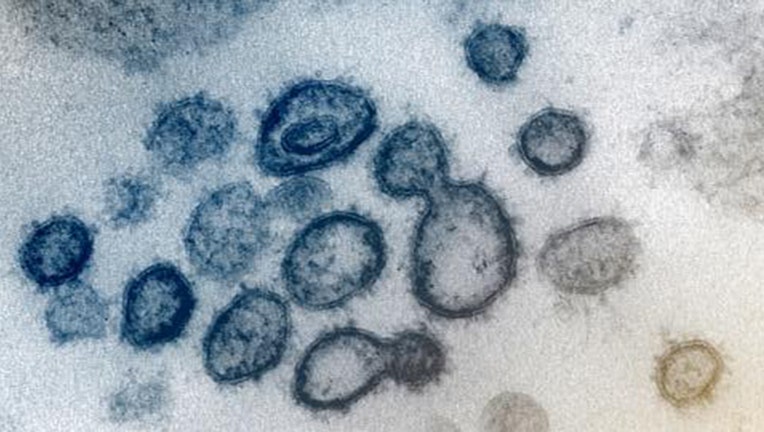Florida reports 17,783 new COVID-19 cases, highest single-day increase

A transmission electron microscope image shows SARS-CoV-2, also known as the 2019 novel coronavirus, which causes COVID-19, isolated from a patient in the United States. Note the crown-like spikes on the outer edge of the virus, hence the term "coron (NIAID-RML)
ORLANDO, Fla. - The Florida Department of Health reported another 17,783 COVID-19 cases on Wednesday.
That is the highest single-day increase of cases yet, with the previous record being set on December 31st with 17,192 more positive COVID-19 cases.
The statewide total of coronavirus infections since the start of the pandemic is now at 1,409,906.
They also reported another 132 deaths, raising the death toll to 22,647.
RELATED: Interactive map of COVID-19 cases across Florida
If you are having trouble seeing the map or using it (especially on a mobile device), click here to load in a new window.
The death toll has increased rapidly in recent months. On October 4th, by comparison, the total was 14,671 Florida resident deaths --- representing an increase of slightly more than 50 percent over the past three months. On November 4th, the total was 16,922 deaths --- representing about a 30 percent increase over the past two months.
Seniors continue to be the hardest hit, with people 65 and older making up about 83 percent of the Florida resident deaths, the Department of Health numbers show. Florida has the fourth-highest number of COVID-19 deaths in the country, behind New York, Texas, and California.
MORE NEWS: 'You have to go home now:' Trump tells Capitol protesters to go home in video tweet

Volusia County officials give coronavirus vaccine update
Officials spoke about the coronavirus vaccine on Wednesday.
Florida is in phase three of reopening with no limitations on restaurants. They must operate at a minimum of 50 percent capacity, regardless of rules by the local government.
The original plan for Phase 3 allowed for the following changes:
- Individuals older than 65 years of age and individuals with a serious underlying medical condition can resume public interactions but should practice social distancing.
- Non-vulnerable populations should consider minimizing time spent in crowded environments.
- Non-essential travel may continue.
- Employees should resume unrestricted staffing of worksites and implement the final phasing in of employees returning to work.
- Employees should resume non-essential travel and adhere to CDC guidelines regarding isolation following travel.
- Local government meetings should return to in-person quorum and public participation for local government bodies.
- Bars, pubs, and nightclubs that derive more than 50 percent of sales from alcohol should operate at full capacity with limited social distancing protocols. Businesses should maintain adequate sanitation practices.
- Restaurants and food service establishments may operate at full capacity with limited social distancing protocols. Businesses should maintain adequate sanitation practices.
- Gyms and fitness centers should open to full capacity but should maintain adequate sanitation practices among employees and patrons during all hours of operation.
- State parks should be fully opened, including overnight accommodations. Beaches should remain fully open.
- Large venues such as movie theaters, concert halls, and bowling alleys should re-open fully with limited social distancing protocols.
- Large spectator sporting events should consider reducing capacity with limited social distancing protocols.
- Theme parks may return to normal operations with limited social distancing protocols.
- Salons, barbershops and nail salons, should operate under full capacity but should consider removing all unnecessary, frequent-touch items such as magazines and newspapers, and maintain sanitation standards.
- Retail businesses should operate at full capacity.
MORE NEWS: PHOTOS: Pro-Trump protesters storm Capitol in DC

Lake County resumes COVID-19 vaccinations after receiving 12K doses
Lake County officials have resumed COVID-19 vaccinations on Wednesday after closing this week because they ran out of doses.
Coronavirus can spread from person to person through small droplets from the nose or mouth, including when an individual coughs or sneezes. These droplets can land on objects and surfaces. Others can then contract the virus by touching these objects or surfaces, then their eyes, nose or mouth.
As stated before, symptoms of the coronavirus include fever, cough and shortness of breath. They may show in as few as two days or as many as 14 days following exposure, the Florida Department of Health says. Most people recover from COVID-19 without special treatment, but the elderly and those with underlying medical problems are more likely to develop serious illness.
If you display coronavirus symptoms, you should contact a local health organization and make them aware of your condition prior to arrival while also following specific instructions or guidelines they may have.
MORE NEWS: Jon Ossoff wins Georgia runoff, giving Democrats control of Senate

AdventHealth now offering COVID vaccine to Volusia County public safety workers
Starting Wednesday, AdventHealth is going to be administering the COVID-19 vaccine to hundreds of public safety workers.
If you are experiencing a medical emergency, call 911 and let them know if you have been infected or believe that you may be. If you are infected, a medical professional or another authority will likely advise that you remain isolated while sick. This includes staying at home and not going into public places or large events.
Please visit the Department’s dedicated COVID-19 webpage for information and guidance regarding COVID-19 in Florida.
For any other questions related to COVID-19 in Florida, please contact the Department’s dedicated COVID-19 Call Center by calling 1-(866) 779-6121. The Call Center is available 24 hours a day. Inquiries may also be emailed to COVID-19@flhealth.gov.
CLICK HERE FOR COMPLETE CORONAVIRUS COVERAGE
Tune in to FOX 35 Orlando for the latest coronavirus news.

